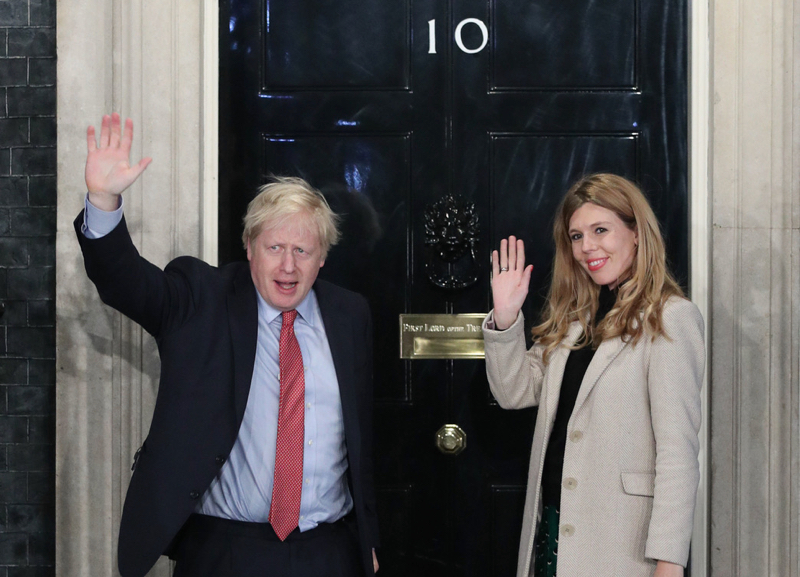The Government's rescue of the domestic airline Flybe marks a watershed moment in British politics. By allowing the overdue payment of tax to be postponed, and promising to ease the burden of the air travel tax surcharge, Boris Johnson has contravened one of the fundamental principles of Thatcherite ideology – that "lame duck" businesses should not be protected by government intervention from the fierce economic logic of market forces. They should be allowed to fail.
At least half of the Johnson cabinet have in the past been enthusiastically signed up to such Thatcherite doctrines, as part of a more general belief that State intervention is in itself a bad thing. Probably everyone of the rest would tick that box if they were told to. As a disciple of Friedrich von Hayek, the free market's most persuasive advocate, Margaret Thatcher regarded "socialist planning and the socialist state" as fulfilling Hayek's prophecy in his book The Road to Serfdom, which she kept by her bedside.
Free markets were the antidote, he declared. State intervention, such as had been common under both Labour and Tory Governments prior to 1979, was an aspect of "socialist planning". The ultimate destination of any systematic State control of the economy was totalitarianism, including the suppression of personal freedom. This doctrine was believed so fervently on the right wing of British politics that it became a dogma, an article of faith it was heresy to challenge.
Indeed, it seeped into the academic study of economics to such an extent that free market ideology was taken for granted as true virtually across the whole academic world, at least the English-speaking parts of it. All those politicians with Oxford PPE degrees would have encountered nothing else in their studies: this was what "economics" was all about.
It was the one great postwar incursion into Tory thinking, previously dominated by One-Nation Conservatism which had made the Tories, in effect, social democrats. This was indeed a well-planned and executed conspiracy by free market "true believers", to capture the commanding heights of economic theory both in Britain and in the United States. They largely succeeded. But, note this: Boris Johnson is not one of them.
The Labour politician who described Mr Johnson's politics as "Thatcherism on steroids" could not have been more wrong. Otherwise he would not have ordered the rescue of Flybe, nor would he have won votes in the general election with his promises of Government action to renew those parts of Britain that had been overlooked by general economic progress.
He has described himself as a "Brexity Hezza", by which he means he admires the willingness of Michael Heseltine, Margaret Thatcher's most trenchant internal critic, to intervene in the economy "before breakfast dinner and tea", but obviously without Lord Heseltine's keen attachment to the European Union. ("Hezza" was Lord Heseltine's nickname in less respectful Tory circles).
Mr Johnson's cabinet has been described as one of the most docile of recent years, because they are aware he holds their ministerial careers in his hands. If they resign over Flybe they will be out of office for five years, possibly ten. Indeed Flybe could be described as a neat piece of stress-testing by the Prime Minister, to see whether any of those alleged Thatcherites are died-in-the-wool free marketeers, Hayekian in tooth and claw, and which of them are prepared – out of self interest – to tack back towards a social democratic model of government.
"Social" means the needs of society take precedence over the dictates of market forces and "democratic" means that those needs are articulated by a democratically elected government. The needs of society were for a British domestic airline to maintain its network of intercity connections, to advance social cohesion and prevent the kingdom falling apart. As for democracy, Mr Johnson has his mandate from the electorate, and a sizeable chunk of his majority in the House of Commons is only there because a number of formerly Labour-voting communities accepted his promise of relief from the ill-winds of market forces and the shrinking of the State they had brought ahout.
The supreme irony of his position is that Margaret Thatcher fomented Euroscepticism in Tory ranks precisely on Hayekian grounds. She said in her famous Bruges speech that she hadn't presided over the retreat of government intervention in the British economy only to see it expanded again by Brussels. One of the main aims of the thrust towards Brexit on the right was to dismantle the web of regulations which the EU had sponsored, restoring the sovereignty of market forces.
The truth that the Johnson government will shortly have to confront, as it seeks a trade deal with the EU, is that every country in the world controls what may or may not be brought across its borders and sold to its people. If British lawn-mower manufacturers wish to sell their machines elsewhere in Europe, they will have to comply with EU regulations about safety, fuel efficiency, noise levels and pollution, whether Britain is inside EU or outside it. So a free market economy can only trade with a social democratic country if it complies with that country's regulations.
Hence the right's dream of a free-market post-Brexit utopia is about to hit the buffers. Boris Johnson is often derided as a man without principles. One of the principles he is without, therefore, is any belief in the overriding value of market forces. And so Flybe still flies, and the Thatcherites are thwarted. Politics, as Margaret Thatcher herself once said, is a funny old game.



 Loading ...
Loading ...
What do you think?
You can post as a subscriber user ...
User comments (0)